In the night, just before five, I woke to the throbbing of my right big toe; it could not be ignored. I decided to clean it. I fished for nail clippers and wet wipes. The nail was filthy and the toe was hot to the touch. I removed the upper, cracked part of the nail where most of the dried blood and dirt had accumulated and scrubbed it with a couple wet wipes, squeezing the liquid into the nail bed—the pain would ease with the day.
Susanna was still awake in Seattle; she’d sent five messages, all deleted. I sent her a voice note—I don’t remember about what. I went back to sleep
Up for good at 9:30, I limped to a coffee I knew would be terrible. Chugi: the decorations, the people, the offerings. What I had thought would be bottles of pressed juice in a picture of a fridge on Google Maps—that most shameful way of discovering a thing only a block away—but it turned out to be house-made soda: blueberry pineapple, mango passionfruit. Sugar syrup dyed with food coloring.
I ordered a coffee and went to wash my face and the rag I used to bathe the night before. I was in there a while relieving myself and getting water all over my shirt. I said thank you, wished the woman with the highlighted pixie cut a good day.
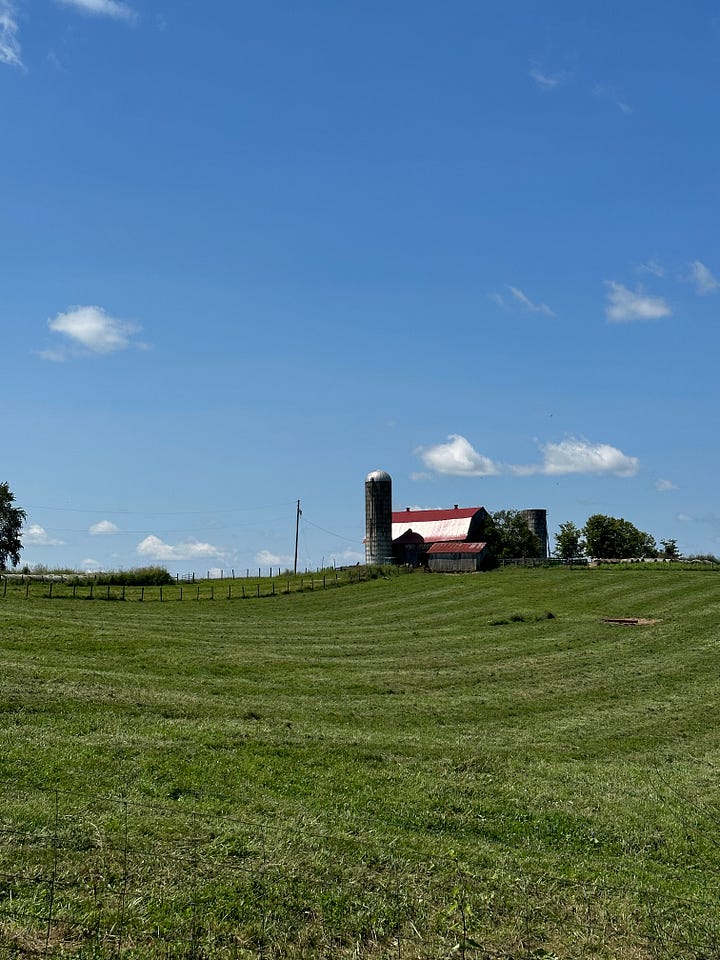
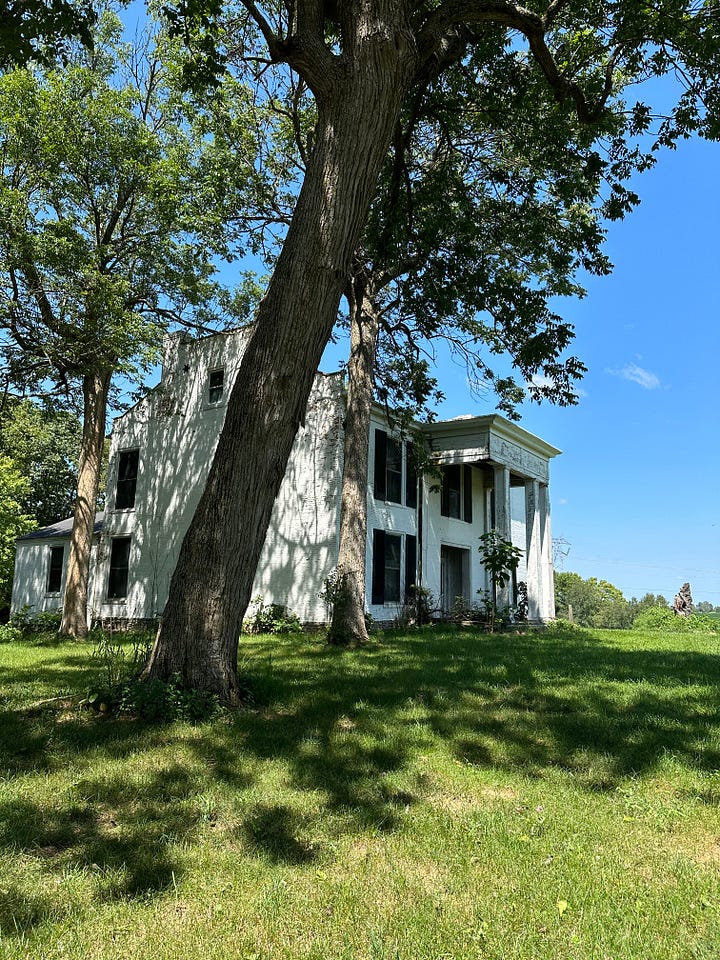
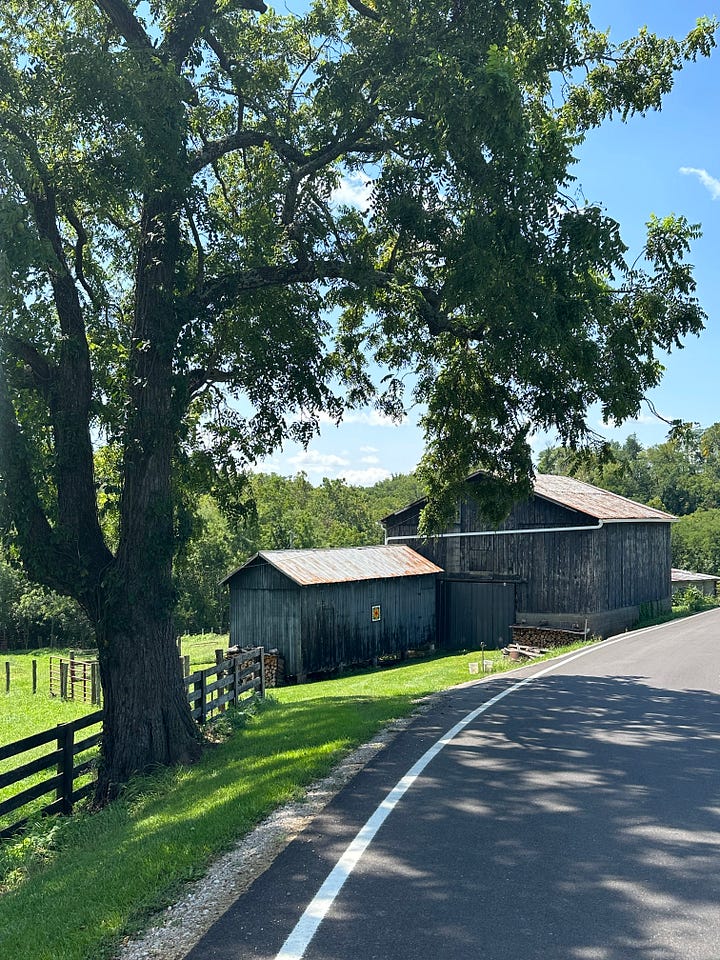
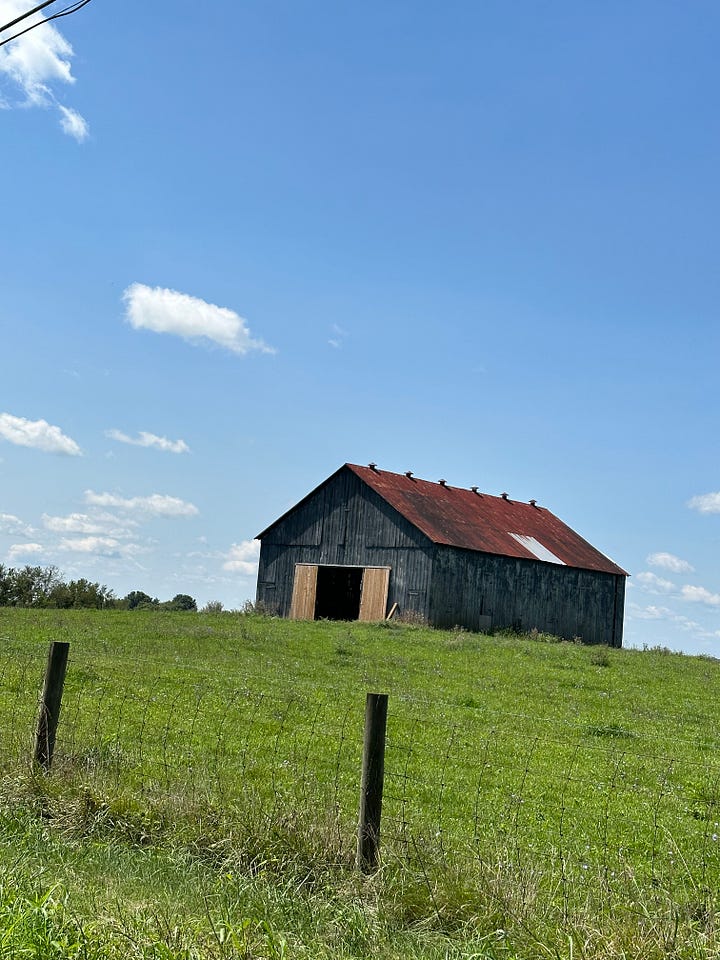
From the car, I saw the farmer’s market across the street—heirloom tomatoes. I crossed, walked through, was greeted. It was small but active. Maybe eight stalls with two tables each, mostly different offerings, everyone friendly. A woman, and I assumed her daughter, were stripping berries from twigs.
“What kind of berries are those?” I asked. “Elderberries.” I’d thought so, and I offered that I’d seen someone once—in a video—do it with a hair pick comb. She’d tried, knew they needed to be frozen, adding that they got mushier that way. “Better to just use your hand gently, then, huh.” She nodded. I walked on, circled and came back. “I like the look of these tomatoes.” I picked up the reddest and one of the largest. “That’ll be $1.25.”
I asked the woman if she could break a $20. She could, and reaching for change, asked where I was from. I told her Florida , but now Seattle, and roadtripping there. “The van with the Country Highway,” she trailed. Yes. Driving around. Coming from West Virginia.
She drew my attention to her dandelion and violet jams—or were they honeys? I recall pectin. The violet one was a deep, purplish orange; the woman attested to the flower’s flavor coming through. I added it to my tomato along with a soft loaf of dairy-free white bread—another $9. 75. “I think that’s everything I needed for my camping trip,” I fished.
“Are you just going from park to park,” she asked, somewhat timidly—a kind fish spooked by the ruse. I tried to say that I was sleeping in the van, but I must have said “yeah with that van, staying in some campsites.” Mentioned fishing, didn’t specify fly. She suggested a campground by Lake Vesuvius—there are some good names in Kentucky. I specified the kind of fishing, mentioning West Virginia and my bad timing .
“Oh, well then this probably won’t be your thing. Don’t let anyone hear but it’s really more of a big pond.” We all three chuckled, sharing our little thanks.
On the edge and the way out of downtown, I passed an old pharmacy, single story, dark blue and lighter blue, an almost art-deco facade, closed but still named Bentley’s. At the next turn, the CVS was busy.
I bought water, Neosporin, Band-Aids—I sprung for name-brand—a bag of ice. My cooler overfull, I tossed the rest of the ice on the parking space next to mine, tidied my mobile bedroom, applied the Neosporin and Band-Aids to my still-infected toe, and drove off over the bridge into Kentucky for the second time, wishing I had asked the woman at the farmer’s market more—why didn’t they have Southern accents? Were their own of Ohio and everyone else’s I’d heard the night before were from across the bridge?
The roads were mostly a bore: wide, two-laned, broad shoulders. Along the highway, the price for a place to stop is a place worth stopping for. The same tradeoff goes for speed of arrival, which I think means: the faster you go, the longer it takes for you to get there (we all know what you find when “there” is reached). But I’m editing this over a year after writing it, so my original meaning may be lost forever.
There was a single lane queue due to construction that added twenty minutes; twenty minutes to what, when I had no idea where I would be stopping, I’m not certain. I smoked a cigarette, my left arm catching sunburn out the window. Whether it was the smoking or the fumes from the wet-black tarmac or both acting together, I started getting a headache as I listened to the same, unpleasant narration of “Moby Dick” that I’d started miles and miles back.
I saw a bloated deer. Then the road shrank, became less busy. I stopped to photograph an old brick, two-story house with tall square columns peeling whitewash tucked behind stone wall and oak. I joined a single lane road so freshly paved it was blue in shade and white in sunshine. The drivers of two trucks turned their larger, lifted wheels to the narrow shoulder to allow me room to pass through their conversation—about what, and how often, I wondered.
A barn with that same quilt-like art that I’d first noticed in North Carolina during my family’s July, 4th vacation, and kept noticing through Virginia, Pennsylvania and West Virginia—where it was presumably sourced—appeared. Shortly after that, a donkey and what I thought was a large, woolen sheep but was actually a large, woolen llama. I pulled to the bending shoulder and clicked my tongue to call the donkey. He came, the llama followed, and he was the kind with a beige cross on its back instead of black, and he’d have liked a stroke on his snout, but I didn’t leave the car to take the photo—I’d gotten too late a start and the road felt too narrow, too curved to allow a longer visit, not to mention I get terrified to get caught petting someone’s livestock no matter their desperation’s attesting to a least a little innocent neglect, a bit of loneliness for a stranger to resolve.
More barns, then four lanes again, and then Paris.
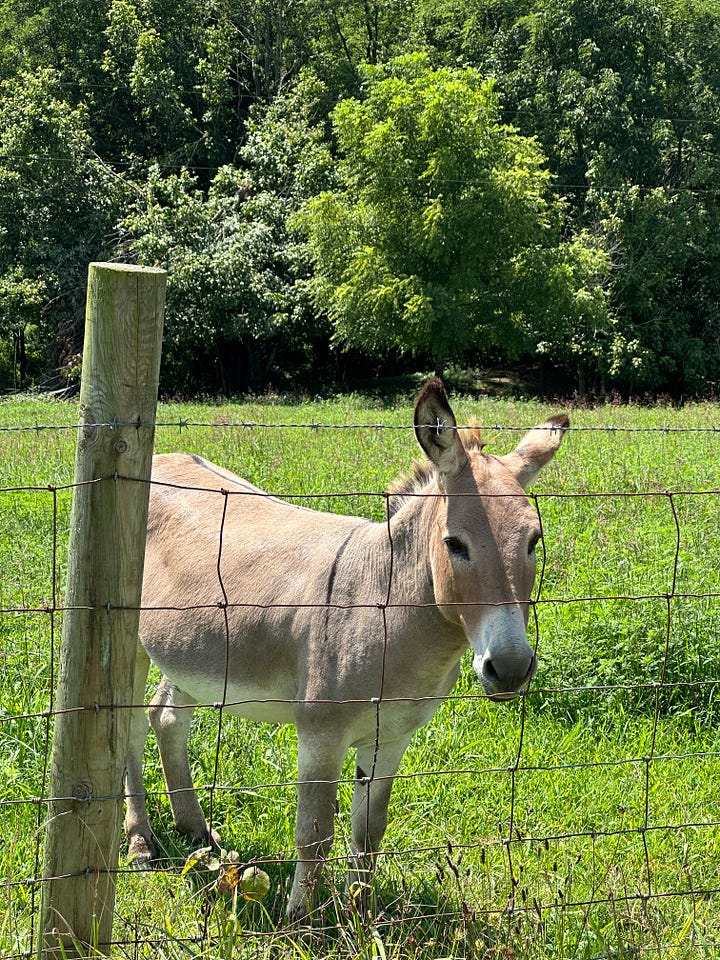
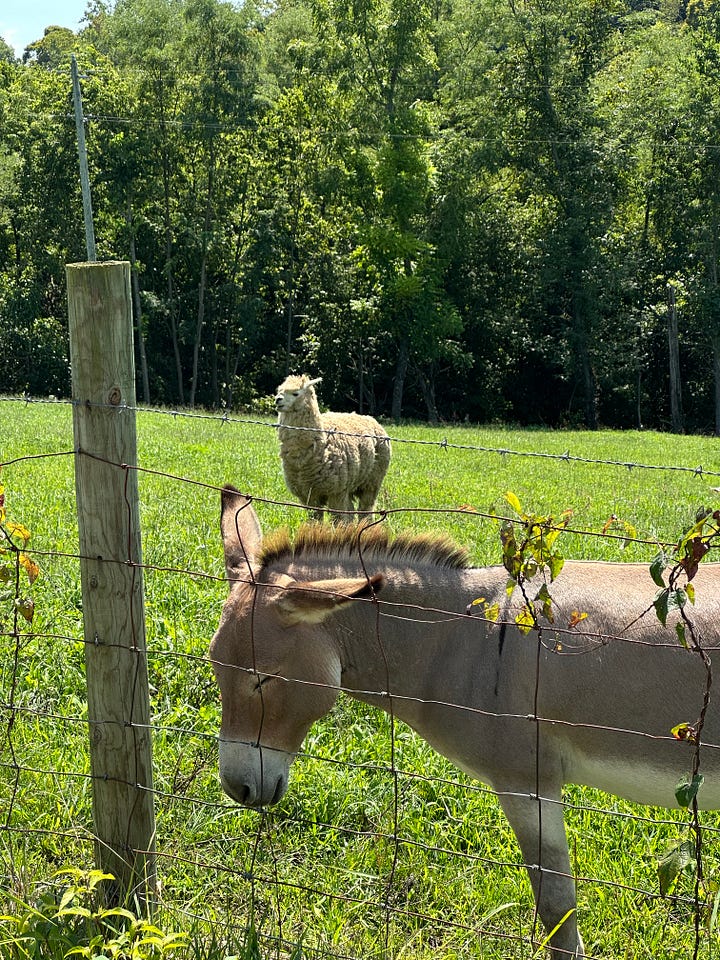
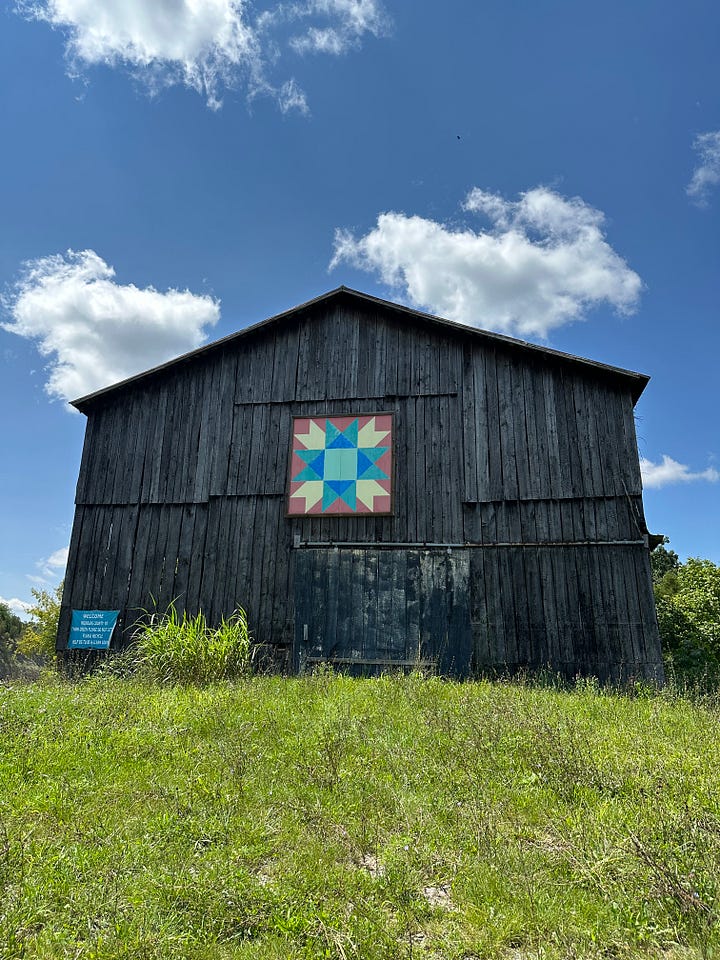

As with many places named for some much bigger somewhere else, “Paris” felt lived-up-to in that peculiar way folks who never cared, or dared, compare it to the original make it, a charm achieved by disregard and in other cases —as the surely less-than-ubiquitously popular Eiffel Tower replica reading “Horses, History, Hospitality” — by comical imitations, whether intentional or otherwise.
No restaurants were open on Main Street, and the one cafe that was had stopped serving Scotch Eggs and offered nothing else tempting. Construction forced a one-way around downtown. I circled the redbrick buildings, parked, and took a few pictures of sparsely furnished storefronts draped with afternoon sun.
I considered briefly finding my way to the bridge and the water below. Had I taken a right after my first loop, I’d have found a park there and a creek called Houston. But I never looked at the map to know, and so I now regret never seeing something I didn’t know even existed, something I lacked the adventurous spirit to seek—perhaps, I was holding out for something down the road.
Lexington was almost too beautiful to bother with. I drove from one end to the other and had a late lunch around 3:30 at Gus’s Fried Chicken. I ordered two pieces of dark meat with greens and a sweat tea, which became three, as well as mac n’ cheese and fried okra. I packed up what was left and toured town, content only to see what I felt I’d no time to experience.
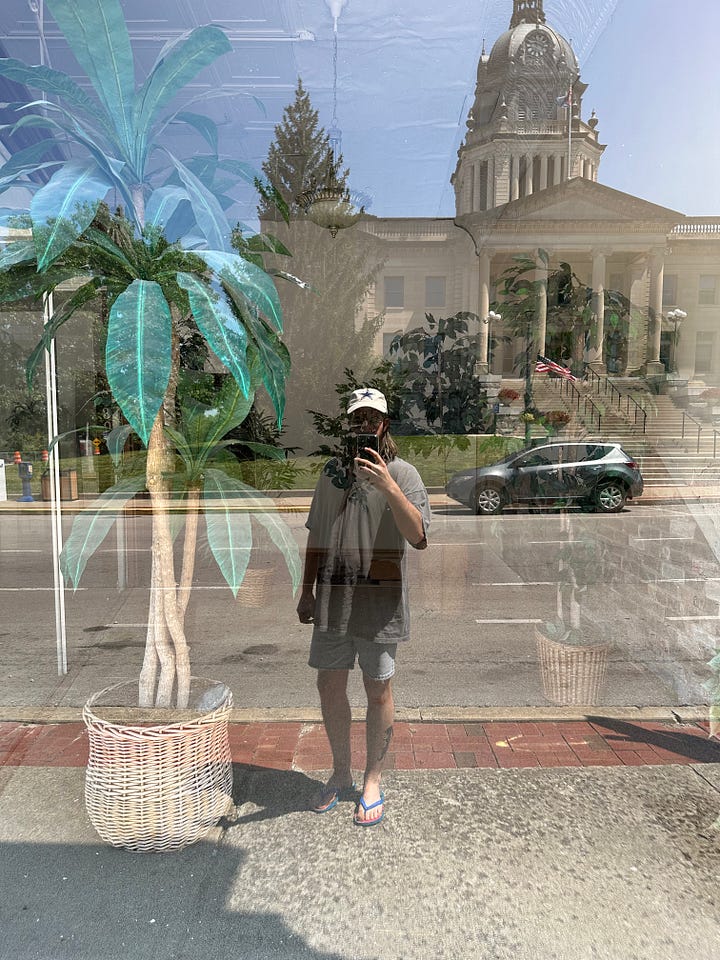


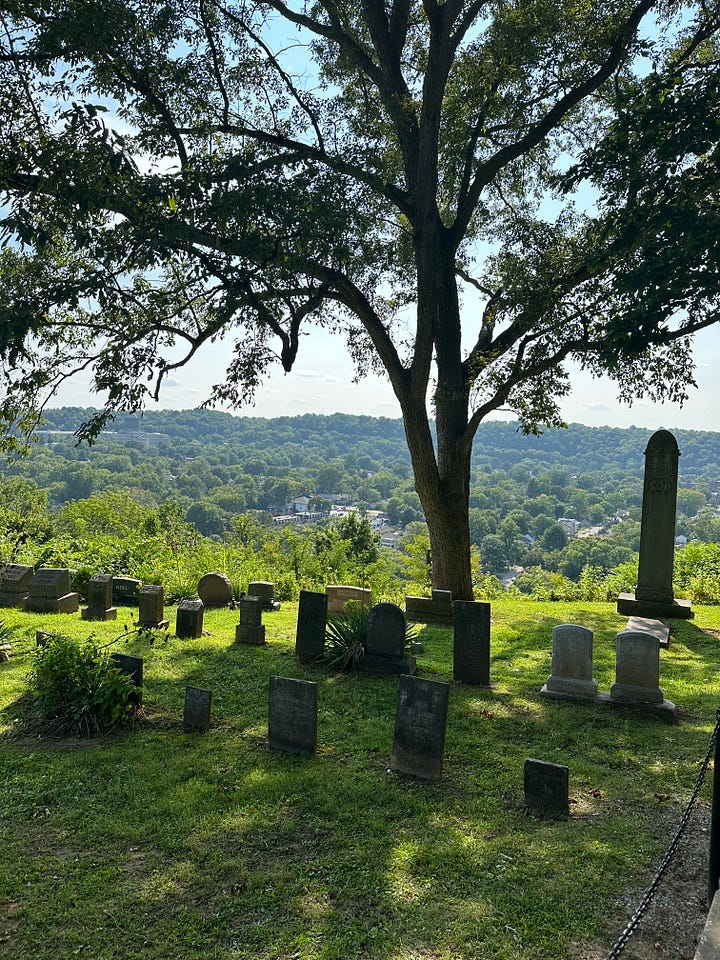
I thought the Lexington houses impressive, until I got to Frankfort—for the Daniel Boone grave. I’d skipped his last Kentucky home but took the chance to see his resting place, also his last—his body’s been buried in Missouri for a quarter century before returning to Frankfurt in 1845. Up on the hill—and seeing no signage denying the right—I lit a cigarette and took in the view of the river-split town.
Like Paris, there was a park near the water, both bigger—I’d seen this one on the map. I tried to find get to the river, but the cut banks of the Kentucky were too deep, too high, and I had to settle for a tangled hike through quite a number of spider webs.
On my way out of the woods, I phoned Susanna, keeping her on as I crawled around Frankfort: the state capitol building, the big, Victorian mansions, the old downtown. There was a street festival downtown, and I felt the parking ruined, so I turned towards Louisville.

Bigger roads with bigger shoulders past acre after acre of manicured bluegrass, all private—Kentucky has so little public space, so little access to public waters. I saw a hill that seemed delicious to roll down and doubled back. There were goats and horses in the adjacent pastures. I left the hill to them.
In “Blue Highways,” Bill writes: “There are two kinds of adventurers: those who go truly hoping to find adventure and those who go secretly hoping they won't. I wondered which man I was, how much proof I had in either direction. Reading this now, I know which.
I pulled into Louisville without diverting to see Versailles—Paris had been enough (enough unfound adventure sought, I suppose). I knew it immediately to be too big a place to give it any serious exploring. Where would one start? Looking at my bank account, already drained too much by too many pit stops, I decided I had too much of what I didn’t already have. I parked under a tree in a quiet part of East Market and climbed into the back of the van. I cleaned myself as best as I could and dressed my toe before smoking the remaining West Virginia weed and doing some writing. I called Susanna again before bed.
Tomorrow, I’ll drive to O’Bannon’s State Park in Indiana—only an hour away—where I can charge my things at the campsite I’ve reserved, enjoy a nearby river, get some sun, some sleep, and eat the big heirloom tomato grown by a woman who might not have been from Ironton.





